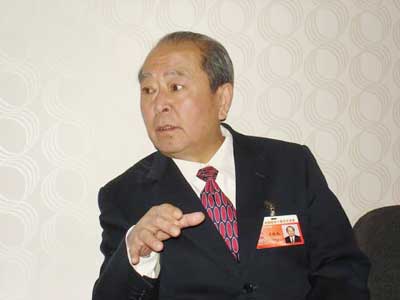| Tools: Save | Print | E-mail | Most Read |
| CPPCC Member: A Harmonious Society Cares for the Disabled |
| Adjust font size: |
A harmonious society combines social justice and fairness in its workings, caring for everyone from all walks of life, in particular, the disabled who need more care and attention, according to Wang Tiecheng, a veteran member of the Chinese People's Political Consultative Conference (CPPCC), in an interview with china.org.cn on the sidelines of the Fifth Plenary Session of the Tenth National Committee of the CPPCC.
Wang is the vice chairman of China Disabled Persons' Federation, although many a film fan in China would know him better as an actor for his portrayal of Zhou Enlai in a number of movies. On the subject of caring for the disabled, Wang said the country will soon implement a new regulation that promotes employment opportunities for them. The regulation imposes a requirement that the disabled must account for no less than 1.5 percent of the work force of government departments, enterprises and institutions. Disabled employees must be given equal opportunities for promotion, salaries and social insurance. The regulations will come into effect on May 1. Statistics show that as of April 1, 2006, China had 82.96 million disabled people, accounting for 6.34 percent of the country's 1.3 billion-strong population. However, only 22.66 million of them were gainfully employed, leaving more than 8.5 million otherwise employable disabled people without work, and this number increases by 300,000 every year. He added that government departments, institutions and enterprises that exceed the 1.5 percent mark, in terms of employing disabled people, will enjoy preferential tax treatment, among other benefits. Wang highlighted that the funds required for the implementation of the regulation will come from the central government budget. A policy change in 2006 effectively raised the requisite funds through local tax authorities. About 1.1 billion yuan (US$137.5 million) was raised last year, almost four times more than in 2005. |
| Tools: Save | Print | E-mail | Most Read |
 |
| Related Stories |
|
Product Directory China Search |
Country Search Hot Buys |
